
PSYCHOLOGY OF ADDICTIVE BEHAVIORS
Scope & Guideline
Illuminating Pathways in Addictive Behavior Research
Introduction
Aims and Scopes
- Substance Use Disorders and Treatment:
The journal explores various substance use disorders, including alcohol, cannabis, and opioids, evaluating treatment methodologies, interventions, and recovery processes. - Behavioral Addictions:
Investigating non-substance-related addictions such as gambling and internet gaming, the journal examines psychological, social, and environmental factors influencing these behaviors. - Psychological Mechanisms:
Research on cognitive, emotional, and behavioral mechanisms underlying addiction is a core area, including studies on motivation, decision-making, and affect regulation. - Demographic and Cultural Considerations:
The journal emphasizes the importance of demographic factors, such as race, gender, and socioeconomic status, in understanding addiction patterns and treatment efficacy. - Innovative Research Methods:
Utilizing advanced methodologies such as ecological momentary assessment, machine learning, and qualitative research, the journal contributes unique insights into addiction behaviors.
Trending and Emerging
- Intersectionality in Addiction Research:
An increasing focus on how multiple social identities (e.g., race, gender, sexual orientation) intersect to influence addiction experiences and treatment outcomes is gaining traction. - Technology-Assisted Interventions:
Research on digital interventions, including mobile applications and online support groups, is on the rise, reflecting a growing interest in leveraging technology for addiction treatment. - Mindfulness and Behavioral Approaches:
There is a notable trend towards integrating mindfulness and behavioral strategies into treatment frameworks, emphasizing their role in managing cravings and promoting recovery. - Ecological Momentary Assessment:
The use of ecological momentary assessment (EMA) to capture real-time data on substance use and related behaviors is increasingly common, providing richer insights into daily patterns and triggers. - Focus on Resilience and Recovery Capital:
Emerging studies are emphasizing recovery capital and resilience factors, examining how social support and personal resources contribute to successful recovery outcomes.
Declining or Waning
- Traditional Risk Factors:
Research focused solely on traditional risk factors for addiction, such as genetic predisposition, is appearing less frequently as the field shifts towards more integrative and contextual analyses. - Generalized Approaches to Treatment:
Broad, one-size-fits-all treatment approaches are becoming less common, with a noticeable decline in studies that do not account for individual differences or contextual factors. - Static Models of Addiction:
The use of static models that do not incorporate dynamic, real-time data or longitudinal perspectives is declining as researchers increasingly favor methodologies that capture the complexities of addiction over time.
Similar Journals
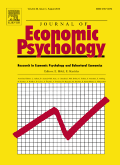
JOURNAL OF ECONOMIC PSYCHOLOGY
Transforming Economic Insights with Psychological PerspectivesThe Journal of Economic Psychology is a premier academic publication dedicated to advancing the understanding of the interrelations between economic behaviors and psychological processes. Published by Elsevier, this journal has established itself as a critical resource for researchers and practitioners in the fields of *Applied Psychology*, *Economics and Econometrics*, and *Sociology and Political Science*, boasting an impressive *Q1* ranking in each category as of 2023. Since its inception in 1981 and with a commitment extending to 2024, the journal provides a platform for high-quality, peer-reviewed research that influences both theoretical frameworks and practical applications. With a rich interdisciplinary approach, the journal addresses pressing issues at the intersection of economics and psychology, facilitating a deeper understanding of how psychological factors drive economic decisions. Researchers looking to share innovative findings, as well as professionals seeking to implement evidence-based practices, will find the *Journal of Economic Psychology* an invaluable asset in their work. The emphasis on rigorous methodologies and relevant topics makes this journal not just a repository of knowledge, but a beacon for future studies that link economic and psychological insights.
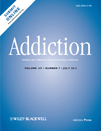
ADDICTION
Empowering professionals to combat addiction effectively.ADDICTION, published by Wiley, is a highly regarded academic journal that serves the vibrant fields of Medicine and Psychiatry and Mental Health. With an impressive impact factor reflective of its significance—ranking in the top 8% and 7.5% of its categories respectively—this journal is esteemed for its rigorous peer-reviewed research which spans a wide array of topics related to addiction, including pharmacology, prevention, and treatment modalities. Since its inception in 1993, ADDICTION has continually provided a platform for innovative research, shaping the discourse and influencing clinical practices worldwide. This journal, based in the United Kingdom at a prestigious location in Hoboken, NJ, stands as a beacon for researchers, practitioners, and students alike, committed to advancing understanding and strategies to combat addiction-related challenges. Although it is not an Open Access publication, the journal's contribution to the field remains invaluable, ensuring that cutting-edge findings are disseminated widely among professionals dedicated to improving mental health outcomes.

Addiction Science & Clinical Practice
Fostering collaboration for a healthier future in addiction care.Addiction Science & Clinical Practice is a premier open-access journal dedicated to advancing the understanding and treatment of addiction through evidence-based research and clinical practice. Published by BMC in the United Kingdom since 2007, this journal has significantly impacted the fields of Clinical Psychology, Medicine, and Psychiatry and Mental Health, proudly securing a Q1 ranking in multiple categories as of 2023. With an emphasis on high-quality research, the journal provides an inclusive platform for the dissemination of innovative findings and clinical insights that address the complexities of addiction. Researchers, practitioners, and students alike benefit from its unrestricted access since 2012, allowing for widespread dissemination of knowledge. Located at CAMPUS, 4 CRINAN ST, LONDON N1 9XW, the journal continues to lead the way in fostering collaboration and informing best practices in addiction science.
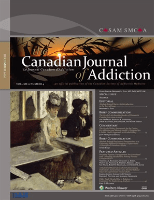
Canadian Journal of Addiction
Advancing the discourse on addiction.Canadian Journal of Addiction is a leading platform dedicated to advancing the understanding of addiction and its multifaceted impacts on individuals and society. Published by LIPPINCOTT WILLIAMS & WILKINS, this journal aims to foster rigorous research and discussion in the field of addiction studies, contributing significantly to the intersection of psychiatry and mental health. With its ISSN 2368-4720 and E-ISSN 2368-4739, the journal is indexed in Scopus and has been categorized in the Q3 quartile for 2023, reflecting its emerging influence amongst peers. The Canadian Journal of Addiction facilitates a vital exchange of ideas and findings, crucial for researchers, practitioners, and students alike, addressing pressing issues related to addiction through innovative studies and insightful reviews. Subscribers and readers benefit from the latest findings as they navigate through the dynamic landscape of addiction research, enriching both academic knowledge and practical applications.
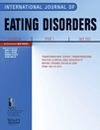
INTERNATIONAL JOURNAL OF EATING DISORDERS
Fostering innovation in psychiatry through dedicated eating disorder research.International Journal of Eating Disorders, published by Wiley, stands as a premier platform for disseminating high-quality research in the field of psychiatry and mental health, particularly focusing on eating disorders. With a respectable impact factor and ranking in the 91st percentile among its peers, this journal is recognized for its rigorous peer-review process and commitment to advancing understanding through empirical evidence. Established in 1981, it has continually evolved, maintaining its status as a Q1 journal in the Scopus category of Psychiatry and Mental Health. The Journal is committed to exploring the multifaceted nature of eating disorders, providing vital insights that support clinicians, researchers, and students alike in their pursuit of knowledge and innovation. Although access is not currently open, the journal offers a wealth of valuable resources for those engaged in cutting-edge research and clinical practice related to eating disorders.

International Journal of Mental Health and Addiction
Championing Research Excellence in Mental HealthThe International Journal of Mental Health and Addiction, published by Springer, stands as a premier resource within the field of psychiatry and mental health. With an impressive impact factor placing it in the Q1 category and ranking #17 out of 567 journals in its discipline according to Scopus, this journal plays a crucial role in advancing scholarly research and practices related to mental health and addiction. Since its inception in 2006, the journal has committed to disseminating high-quality, peer-reviewed work that addresses contemporary challenges in mental health, including innovative treatment strategies, policy implications, and psychosocial dynamics. Operating from New York, USA, the journal also aims to foster interdisciplinary collaboration, providing a platform for researchers, clinicians, and policymakers. While it does not offer open access, the publication is dedicated to making impactful research accessible to its audience by ensuring that content is widely disseminated. The International Journal of Mental Health and Addiction, with its rigorous editorial standards and dedication to mental health advancement, remains an essential journal for anyone pursuing knowledge in the ever-evolving landscape of mental health and addiction.

NEUROPSYCHOBIOLOGY
Challenging Boundaries: Advancing Neuropsychological ScienceNEUROPSYCHOBIOLOGY, published by KARGER, is a leading academic journal that has been at the forefront of exploring the intricate relationships between neuroscience and psychological processes since its inception in 1975. With both an ISSN of 0302-282X and an E-ISSN of 1423-0224, the journal is renowned for its rigorous peer-reviewed articles and significant contributions to the fields of Biological Psychiatry, Neuropsychology, and Physiological Psychology. Its impact is reflected in its esteemed Scopus rankings, standing out in the 92nd and 81st percentiles in their respective categories. With a commitment to advancing understanding in mental health and neurological science, NEUROPSYCHOBIOLOGY is classified in the Q3 and Q1 quartiles, making it a vital resource for researchers, clinicians, and students alike. Based in Switzerland, the journal embraces a holistic approach to psychological research, bridging gaps between theoretical frameworks and practical applications, thus promoting impactful advancements in the understanding of the human mind.
Explore the latest findings and theories with NEUROPSYCHOBIOLOGY, where your work can contribute to the evolving landscape of neuropsychological studies.
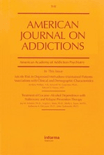
AMERICAN JOURNAL ON ADDICTIONS
Bridging Research and Practice in Addiction StudiesThe AMERICAN JOURNAL ON ADDICTIONS, published by WILEY, stands as a premier publication within the realms of Clinical Psychology, Medicine, and Psychiatry. With its ISSN 1055-0496 and E-ISSN 1521-0391, the journal has been a critical resource since its inception in 1992, consistently evolving to encompass a wide scope of addiction research and its implications on public health. Renowned for its rigorous peer-reviewed articles, it boasts impressive rankings, including Q1 status in both Clinical Psychology and Medicine (miscellaneous) for 2023, and a respectable Q2 in Psychiatry and Mental Health. As a foundational platform for disseminating cutting-edge research, the journal aims to facilitate the exchange of knowledge among researchers, healthcare professionals, and educators alike. Its significant impact on the academic community is underscored by its Scopus rankings—placing it in the top 26% of Clinical Psychology journals and the top 28% in Medicine (miscellaneous). By fostering an understanding of addiction and its treatments, the AMERICAN JOURNAL ON ADDICTIONS plays an essential role in guiding innovative practices and shaping future policies within the field.

Behavioral Psychology-Psicologia Conductual
Cultivating Knowledge for Tomorrow's Psychological ChallengesBehavioral Psychology-Psicologia Conductual is a pioneering journal dedicated to advancing the field of psychology, with a specific focus on clinical and experimental domains. Published by FUNDACION VECA PARA AVANCE PSICOLOGIA in Spain, this journal serves as a vital resource for researchers, professionals, and students seeking to explore contemporary practices and theoretical frameworks in behavioral psychology. With its ISSN 1132-9483 and E-ISSN 1132-9483, the journal has established itself over a span of nearly three decades, from 1996 to 2024, contributing significantly to the academic discourse. While it currently holds a Q3 ranking in Clinical Psychology and a Q4 ranking in Experimental and Cognitive Psychology as of 2023, it aims to promote knowledge synthesis and innovative approaches to psychological research. Despite the absence of an open-access model, the journal's rigorous peer-review process ensures the dissemination of high-quality research that resonates with the needs of a growing audience dedicated to enhancing psychological practice and theory.

Adicciones
Elevating research to combat addiction challenges.Adicciones is a prominent academic journal dedicated to the fields of Medicine and Psychiatry, focusing on the multi-faceted issues surrounding addiction and substance use. Published by SOCIDROGALCOHOL in Spain, this journal has been a critical resource for researchers, clinicians, and students since its inception in 1994, with a commitment to advancing knowledge in addiction science for the benefit of public health. With an impressive impact factor that places it in the Q3 category of both Medicine (Miscellaneous) and Psychiatry and Mental Health according to 2023 rankings, Adicciones is recognized for its high-quality peer-reviewed articles that contribute to the ongoing dialogue in these vital fields. Although not currently an open-access journal, it provides valuable subscription-based access to its extensive repository of research findings and reviews, fostering a deeper understanding of the complex dynamics of addiction. The journal's continued relevance is underscored by its convergence into 2024, promising ongoing contributions that inspire new ideas and practices to combat addiction.